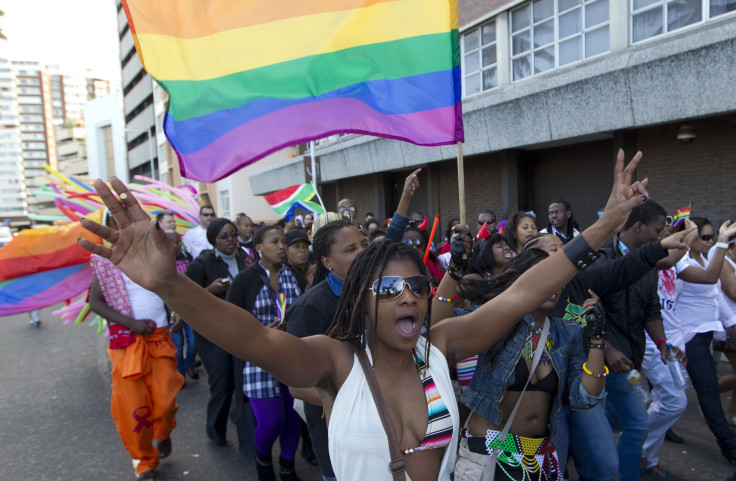Gay Rights In Africa: Easy To Champion From Afar, Fatal To Defend From Within

Human rights activist Eric Ohena Lembembe was brutally murdered last week by unknown assailants at his home in the West African country of Cameroon, and the government's stubborn silence since then has made the gruesome fatality even more devastating.
Lembembe was a vocal defender of lesbian, gay, bisexual and transgender, or LGBT, people and the executive director of the Cameroonian Foundation for AIDS, or Camfaids. He worked often with Human Rights Watch, which reported last week that Lembembe had been found dead in his home last Monday by friends who had been trying to get in touch with him all weekend.
"They found his front door padlocked on the outside, but could see Lembembe’s body lying on his bed through the window," said the report. "Lembembe’s friends alerted the police, who broke down the door. According to one friend, Lembembe’s neck and feet appeared to have been broken, and his face, hands, and feet had been burned with an iron."
The incident has turned an international spotlight on Cameroon, but the issue is much broader than that. Because, when it comes to gay rights, Africa is home to some of the world's most intolerant policies.
The Power of Silence
The Cameroonian government has angered gay rights defenders around the world by refusing to publicly condemn last week's gruesome assault. One week since Lembembe was found dead, its only statement on the issue has been a combative one.
"Backed by certain civil society activists and at times by some of our compatriots, the international media have launched attacks on our nation, dragging its image into the mud," government spokesman Issa Tchiroma said, calling on international media to exercise restraint on this issue.
And, despite pleas from international organizations such as HRW and the United Nations, it doesn't appear that any rigorous investigation into the murder is under way.
In their arguments against LGBT defenders, Cameroonian officials often rely on the notion that gay rights is a Western cause -- something that has no place in the country's society. But Lembembe challenged that notion as a gay Cameroonian who had no qualms about speaking up for his community.
Neela Ghoshal, an HRW researcher who worked with Lembembe, wrote about his tenacity in the Daily Beast shortly after his death. She recalls a meeting the two activists had arranged with Cameroonian officials to discuss LGBT rights. She was dismissed as an outsider, but Lembembe was able to hold their attention -- even if only briefly.
"I am Cameroonian, like you," he said, according to Ghoshal. "Let’s be serious. We all know that gay people exist in Cameroon. In fact, they exist in all of our families. And we all know that they are mistreated. Would you tolerate this abuse if this were your brother? Would you laugh at it, if this were your sister?"
Lembembe's poignant words didn't stick. And, his own death doesn't seem to have changed the government's attitude toward LGBT people, and homosexuality is still punishable by up to five years behind bars in Cameroon.
International Inequalities
Cameroon is home to some of the African continent's worst human rights abuses against those believed to be homosexuals where these "suspects" might face anything from lengthy legal procedures to forced anal exams and inhumane prison conditions.
But plenty of other African countries practice similar legalized prejudices and LGBT activists all over the continent face steep odds.
Homosexuality is outlawed in 38 sub-Saharan African countries, according to a report last month from Amnesty International. In some countries, the status of a LGBT person is hazy as there may be differentiations between male and female activities or varying degrees of adherence to the code of law.
For instance, in certain areas of Nigeria, Sudan, Mauritania and Somalia, a citizen can get the death penalty for engaging in homosexual acts. In Uganda, LGBT people are on edge over the potential passage of a bill that was drafted in 2009 and has been tabled because it was criticized by aid donors. The bill's earliest draft suggested the death penalty for homosexuals. In Liberia, bills to strengthen laws against LGBT people were introduced last year, though they are in limbo in the legislature.
Of course, laws aren't the only threats to gay rights in Africa as Lembembe's case shows.
Social attitudes and criminal violence can bring fear, isolation and death. LGBT people across the continent often find themselves victims of a witch-hunt mentality, desperate to conceal their identities or orientations lest they be targeted by homophobic compatriots.
The only country that preserves gay rights -- including gay marriage -- in its very constitution is South Africa. But even there, social attitudes can make it difficult for average citizens to freely practice LGBT lifestyles.
From Near, From Far
U.S President Barack Obama urged African nations to rethink their stance on gay rights during his visit last month to Senegal, where homosexuality is a crime. "When it comes to how the state treats people, how the law treats people, I believe that everybody has to be treated equally," Obama said.
Similar sentiments -- including specific condemnations of Cameroon's treatment of the Lembembe case -- have come from several of the country's Western donors.
While international leaders and organizations can condemn Africa's anti-LGBT human rights abuses from a safe distance, Lembembe and others like him face life-threatening risks in their fight for equality. But their voices may be more powerful than anyone else's simply because they prove that gay rights in Africa is more than an idea -- it is a real-life issue that affects millions of people who live and die on the continent every day.
"I don’t know whether Lembembe’s murder will be solved," wrote the victim's colleague Ghoshal, in the Daily Beast. "But I do know that you cannot kill this movement. Lembembe’s legacy will live on."
© Copyright IBTimes 2024. All rights reserved.











